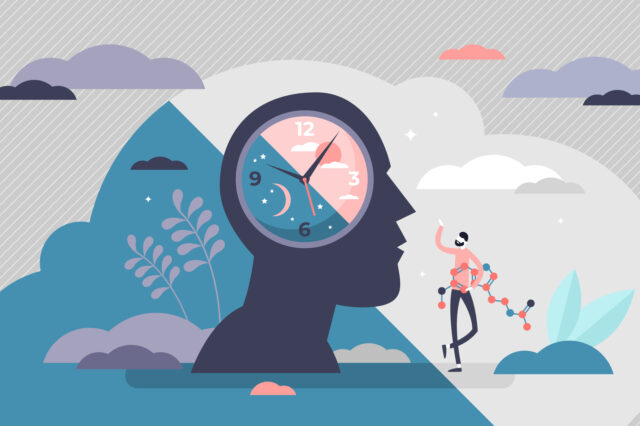Modest exercise can cue beneficial changes to body’s internal clock, study in mice shows

Just an hour of exercise a day resets the muscular “clocks” in mice by about an hour, University of Florida Health researchers have found. If replicated in humans, the findings could have important implications for using exercise to reset disrupted biological clocks in older adults and night shift workers, the researchers said.
Circadian rhythms, the biological clock encoded in the DNA of all cells, keep life in tune with the rotation of the Earth and the cycle of night and day. Even short periods of exercise can shift the biological clock in mouse muscles, the researchers found. Exercise is a cue that helps to optimize cellular activity in muscles by fine-tuning energy use and storage as well as other functions, said Karyn Esser, Ph.D., a professor in the UF College of Medicine’s department of physiology and functional genomics.
The findings by Esser and postdoctoral associates Denise Kemler, Ph.D., and Christopher A. Wolff, Ph.D., were published Sunday in The Journal of Physiology.
“This research is really important because it highlights the effect exercise can have on our body clocks. If this is replicated in humans, it means that night shift workers can use exercise to help adjust their body clocks. We may also be able to use exercise as a treatment for a ‘body clock disorders’ that can occur with age and in many chronic diseases,” Wolff said.
To establish their findings, the researchers put a group of 30 mice though moderate treadmill exercise during three different phases of the day that are roughly equivalent to day and night in humans. They also evaluated how the amount of a primary “body clock” protein in the muscles changed over time due to exercise. The results showed how the timing of exercise can rewind or fast forward the muscles’ biological clocks. For the first time, the researchers showed that a single bout of moderate-intensity exercise shifts the circadian clock in the skeletal muscles of mice.
The findings suggest that exercise can be strategically timed to help bring muscles’ biological clocks closer to an ideal state, Esser said. For example, cells typically burn more sugars and fats earlier in the day and store more of it later in the day. The timing of exercise is one way to help reset muscles’ “clocks” so that energy is used or stored more optimally, Esser said. Fine-tuning the muscles’ clocks might also help to address diseases in which the body’s clock is running ahead or behind.
For night shift workers, older people and those with certain conditions such as cardiovascular disease, the findings could have significant implications.
Late-night work shifts can disrupt the biological clocks within muscles and the rest of the body — a phenomenon that Esser likens to work-induced jet lag. Esser said the findings suggest that even a modest amount of exercise at the right time can help restore that balance. Exercise during the middle of the “active period” — which would correspond to the most active part of the day in humans — appears to deliver the most benefit to muscles’ biological clocks in mice, she noted.
“Using clock time cues like exercise could help bring the dysfunctional muscle clocks into the same time zone,” she said.
Next, Esser wants to learn more about how muscle contractions “talk” to the clock mechanism in muscle cells, which could reveal optimal targets for future medications. Other aspects that could be studied include how the intensity and duration of exercise affect the body’s clock as well as whether resistance exercise such as weightlifting can provide the same body clock benefit as endurance training.
While the findings have only been applied in mice so far, the researchers noted that it could likely move forward in humans without a clinical trial because it only involves exercise timing for certain conditions.
“Exercise works with the circadian clock and both of these things are important for your health and resilience. So, stay active, but try to keep it during the normal, active phase of the day,” Esser said.
The National Institutes of Health provided funding for the research (grants R01AR066082 and U01AG055137).
About the author
